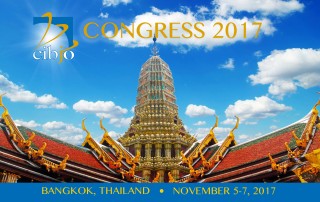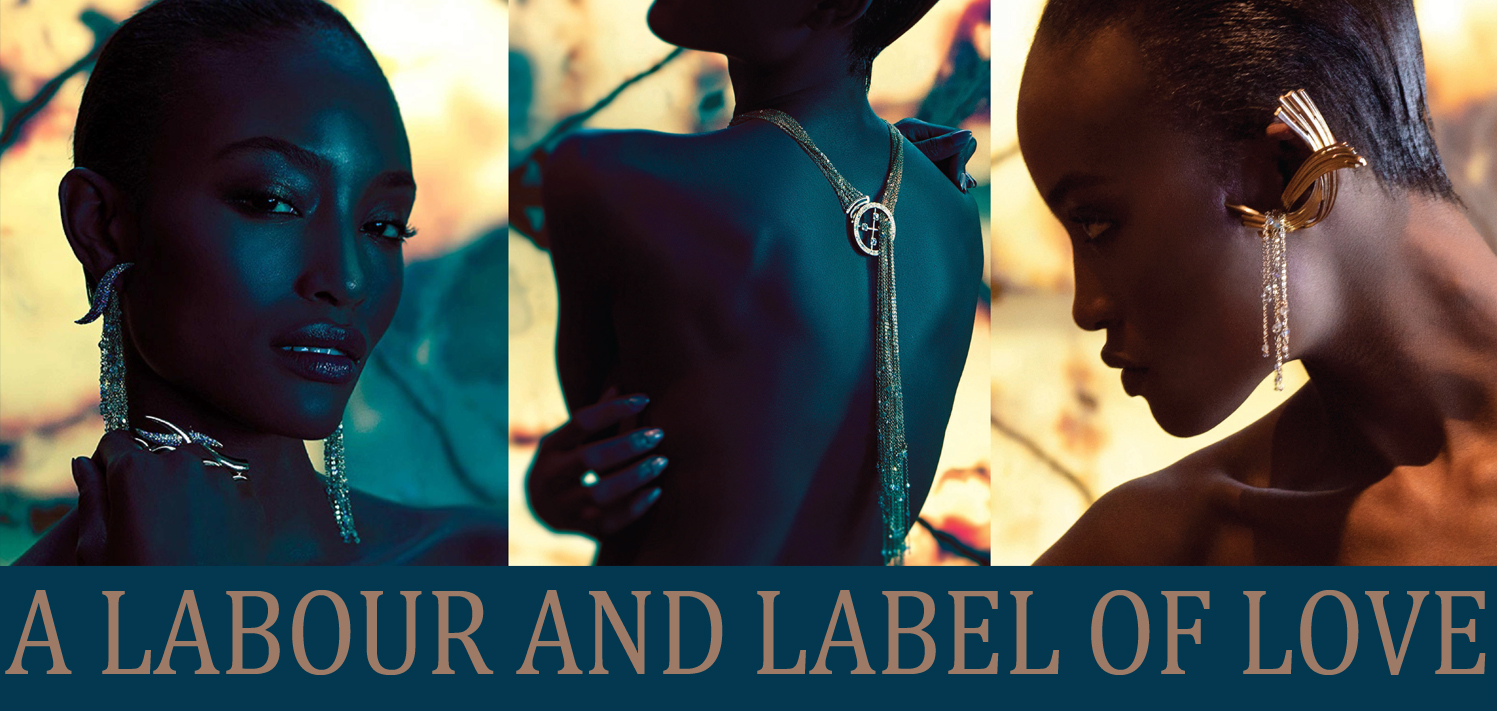About Steven Benson
This author has not yet filled in any details.So far Steven Benson has created 302 blog entries.
2017 CIBJO Congress to take place in Bangkok, Thailand, November 5-7
APRIL 4, 2017
CIBJO, the World Jewellery Confederation, will hold its 2017 annual congress in Bangkok, Thailand, November 5-7, 2016, with pre-congress meetings beginning on November 2. The World Ruby Forum, which is being organised in conjunction with the congress, will take place November 4.
The congress will be hosted by the Department of International Trade Promotion (DITP) and the Gem and Jewellery Institute of Thailand (GIT), both of which fall under the jurisdiction of the Thai Ministry of Commerce. The official invitation to conduct the event in Bangkok was issued by Mrs. Apiradi Tantraporn, Thailand’s Minister of Commerce.
The main venue for the CIBJO Congress will be the renowned Shangri-La Bangkok, located on the banks of the Chao Phraya River, the major waterway that flows through Thailand’s capital city.
CIBJO Congresses serve as the official gathering place for the World Jewellery Confederation’s Assembly of Delegates, and also are the venue for the annual meetings of CIBJO’s sectoral commissions, where amendments can be introduced to the organisation’s definitive directories of international industry standards for diamonds, coloured stones, pearls, gem labs, precious metals and coral, known as the Blue Books.
The CIBJO Congress is also where the programme of World Jewellery Confederation Education Foundation (WJCEF), relating to responsible and sustainable activities in the industry, and CIBJO’s ongoing cooperation with the United Nations and its development programme is reported upon.
It is the second time that a CIBJO Congress will take place in Bangkok, with the first having been held in the city in 2004. Thailand is a leading world centre in the coloured gemstone and jewellery industries, reporting about $10 billion worth of exports per annum, with close to 16,000 companies employing some 1.3 million individuals. Jewellery and gemstones make up the country’s third largest export category.
“The fact that the CIBJO Congress is returning to Bangkok is a testament to Thailand’s central role in almost every category of our business, from mining all the way through to jewellery retail, not only in South East Asia, but globally as well,” said Gaetano Cavalieri, CIBJO President. “We thank the Thai government for its generous invitation, as well as DITP and GIT, and invite members of the gem and jewellery sectors from around the world to join us, and to participate in our deliberations, which will impact on stakeholders along the entire chain of distribution. We also are honoured to be able to work in tandem with the World Ruby Forum, which in itself will be a milestone event.”
A dedicated CIBJO Congress 2017 website will be launched shortly.
CIBJO President meets with Fisheries Minister of Fiji, pledges support for development of responsible pearl industry
CIBJO President Gaetano Cavalieri (left), meeting in Hong Kong with Semi Koroilavesau, the Minister of Fisheries of the Republic of Fiji.
APRIL 3, 2017
President Gaetano Cavalieri has met in Hong Kong with Semi Koroilavesau, the Minister of Fisheries of the Republic of Fiji, and during the meeting pledged the World Jewellery Confederation’s support for the South Pacific nation’s effort to develop its pearl industry as a standard bearer for environmental and social responsibility.
Fiji, which is a relative newcomer to the South Pacific pearl industry, is home to a growing perliculture sector, which in 2017 is forecast to produce about 30,000 pearls. The country’s Ministry of Fisheries, which has jurisdiction over the sector, is strategically committed to developing the economic potential of the country’s marine sources, while at the same time ensuring that that such activities are environmentally sustainable and have wide-ranging positive social impacts.
During the meeting Mr. Koroilavesau outlined the Fijian government’s long-term plan for its pearl sector, and reiterated its goal that the country become a significant producer of high-quality pearls, of distinctive appearance and character, for which the principles of social and environmental sustainability are an integral component of their brand identity. For the people of Fiji, he said, pearls are not simply jewels of the ocean, but they also represent the promise of a better and sustainable future.
“Fiji is as exciting prospect for our industry, and not only because of its already proven ability to produce pearls of exceptional quality,” said Dr. Cavalieri. “Its pearl industry will flourish also though the respect its shows for the marine environment, and through the support it provides the farming communities and their stakeholders. CIBJO is proud to be associated with such an enterprise.”
Mr. Koroilavesau invited Dr. Cavalieri to join the Fijian delegation at the World Oceans Day Session at the United Nations in New York on June 8, where its plan for an environmentally and socially sustainable national pearl sector will be publicly presented.
A partnership spanning continents brings hope to the survivors of genocide in Rwanda


Jennifer Ewah is the founder and creative director of Eden Diodati, a jewellery brand committed to fulfilling a social function, which is assisting the creation of sustainable and dignified employment for disadvantaged people in Rwanda. An Oxford-trained lawyer, she balances a legal career with one of a jewellery designer. She is the winner of numerous awards, including the International Sustainable Brand of the Year 2013 outside of Latin America, from the Centre for Study of Sustainable Luxury, and she is a Fellow of Ethical Fashion Forum’s 500 Ethical Leaders around the World.
By Jennifer Ewah
The story I am about to tell is about jewellery and its impact on humanity. It is a tale of rebirth through creativity and personal journey, and about a group of remarkably brave and resilient women from Rwanda, seeking to rebuild their lives following the devastation of civil war and genocide.
I myself am not Rwandan, and originally was not even a jeweller. I come from a family of medics and politicians from Nigeria. I providentially studied law at Oxford University, and that compelled me to move further towards the path of social justice, combined with progressive philanthropy.
But I always had a creative inclination. Growing up in the environment that I did, the Benin bronzes, a group of more than one thousand metal plaques and sculptures that once decorated the royal palace of the Benin Kingdom, in what is today Nigeria, provided a constant reminder of the rich artistic legacy of the African continent. Inspired by my home and heritage, I began designing and drawing from age three, and many years later, after studying at Central St Martins, the London College of Fashion, and than at Beaux Arts in Paris, I discovered my true métier.
I established in Eden Diodati in 2015 as a socially sustainable luxury jewellery brand. A key component of its operation was and still remains a partnership with a social cooperative in East Africa, which serves formerly marginalised women artisans, many of whom experienced personally the horrors of the genocide in Rwanda in 1994. The brand’s name evokes the utopian garden from the Book of Genesis, but also pays tribute to Giovanni Diodati (1576-1649), the Swiss-born Italian theologian, who was the first translator of the Bible into Italian from its orginal Hebrew and Greek. He was a pioneer.
The Rwandan cooperative with which we partner was founded by two sisters in Kigali, both with a jewellery design background. They organised what was then about 20 women, teaching them how to weave and bead, and then to enhance their skills with new techniques. After gathering under its umbrella more orphaned and widowed women, the organisation today provides work for more than 5,000 female survivors, organized into 52 smaller cooperatives. Many of its members are living with HIV and AIDS after experiencing gender-based violence during the conflict.


Master weavers from the Rwandan cooperative, two of 5,000 women now involved in the creation of jewellery pieces headed for the world’s luxury markets, alongside a gold neckpiece highlighted by beading by Eden Diodati.
Eden Diodati was brand born out of my desire to capture the compassion, empathy and strength that is at the heart of the beauty of the women that I know – my mother, a doctor, being the foremost example. Its artistic style is but one aspect of its mission. Social activism is another.
My vision was to evoke beauty through crafting luxury pieces with a strong, beautiful aesthetic, yet also to commit to love for others. The ethical aspect of our supply chain is not independent of its visual aspect; it informs, inspires and sustains people and communities in the most fundamental way.
For me, talking to the founders of this Rwandan cooperative felt like the first of a series of little miracles. “The Garden of Eden” is not found in perfect circumstances, but in courageous daily acts of love, forgiveness and generosity such as those shown gracefully by the women towards each other – Hutu and Tutsi working side by side.
Employing centuries-old artisanal heritage with comptempory technique, the Rwandan women’s courage, skill, fortitude and faith help challenging pre-conceptions of “Made in Africa.” Our goal is to shift paradigms in high-end jewellery and bring to market ethical luxury, within a brand context, affording priority to craftsmanship, provenance and elevated design.
Jeanette is our lead craftswoman and Eden Diodati’s project manager artisan within the Master Weavers of my partner cooperative. She was orphaned during the genocide and was the sole survivor in her entire family. Today, we see her transformed through the community of the cooperative. She is a confident, elegant and creative woman who holds firmly to an immutable sense of personal gifting, despite the trauma of the beginning of her life.
Another master weaver, Sada, contracted HIV through gender-based violence during the conflict. She struggles daily with the scourge of her illness. Her deep courage, smile and femininity is almost always in my mind, and her courage represents the cornerstone of what Eden Diodati is. It is a brand providing sustainable income to formerly marginalised artisans, but it is also a conduit that exposes humanity through the light of love and solidarity. Each piece reflect the stories of craftswomen who had the breath-taking courage to look up beyond dark circumstances, in order to be sustained symbiotically by the work of their hands and the inherent creativity of their souls.
Reflecting how this celebration of artisanal heritage transcends cultures, Eden Diodati works on the opposite side of the globe in Italy where the metal components are manufactured by a Responsible Jewellery Council-accredited partner. These are then combined with the beaded elements produced in Rwanda. Our story represents collaboration across continents for positive social good. All the while, a geo-continental amalgam of global cultures influences the design.
We do not compromise. Although we are committed to providing sustainable employment to formerly marginalised and vulnerable women, our collections are design-led and of exceptionally high quality, to ensure that luxury customers who want to invest in our pieces receive the value they deserve. Our circle of ethical production enables clients to empower women sustainably, and enables our clientele the opportunity to experience beauty through compassion.
Eden Diodati donates 10 percent of shareholder dividends to Médecins Sans Frontières, which is also known as Doctors Without Borders. It is an international NGO, established by a group of doctors and journalists in France in 1971, which is best known for its projects in war-torn regions and developing countries affected by endemic diseases, and whose survival is threatened by violence, neglect and catastrophe, primarily due to armed conflict. In 1999 MSF was awarded the Nobel Peace Prize.
The exhilarating reality of our story and my journey has always been and always will be the people and relationships built through it, from young, talented friends and colleagues, to visionary Rwandan social business leaders. Creative and emotional bonds have formed, and common understandings of purpose and trust have developed. I, and all those I work with closely, have a desire to see sustainable luxury brought to the fore of mainstream consciousness.
The depth of what this brand means to me is indescribable. It is the pursuit of my heart, and is why I face all challenges with optimism and faith.
Love is my inspiration, and love never fails.






